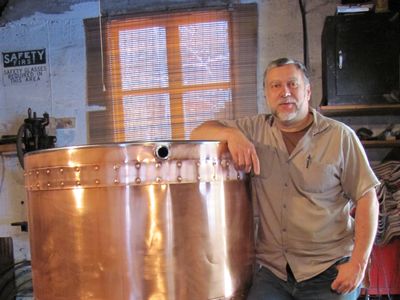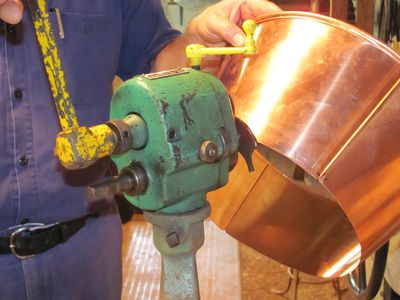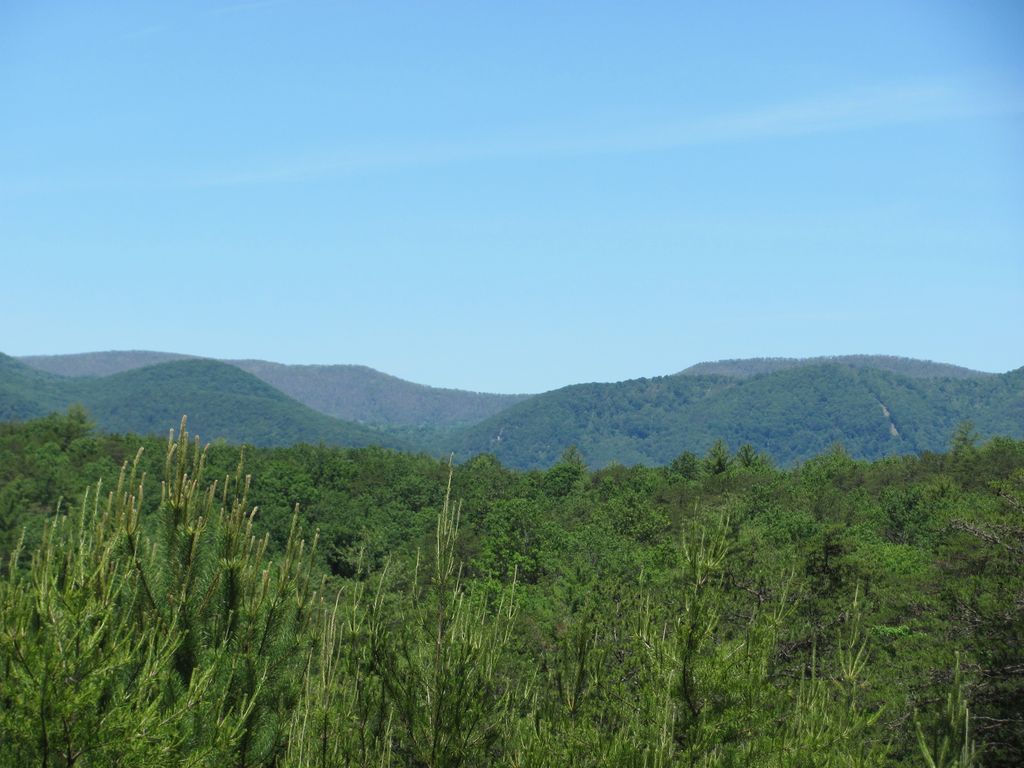
I am a native Appalachian Mountain craftsman. My family lines have been in the southern Appalachian mountains for many generations. My parents started married life in an old log house, tucked up in a wooded "holler", on my great-grandfather's land. That is where I was raised. What they passed down to me, from my Scots-Irish ancestors, has been a collection of folk ways and skills that has allowed us to survive in our rugged and rural region. As I can of age, and was enticed to leave for far-off jobs, I realized that many of the old-ways were fading away. I then set out to help preserve some of these old shop skills and try to make a living with them.
For many years, I did rustic "pioneer" type woodworking - where one can take just a box of hand-tools, along with some fresh cut Oak logs, then build all your own farm tools and cabin furnishings. I sold through a couple mail order catalogs, and often did work for movie and TV productions. Then, I had an opportunity to work for an old man, nearby me, to learn the secrets of the coppersmithing trade. Our region is well known for apple butter and moonshining - both needing the services of coppersmiths. And, before you ask, I can not make you a still unless you have a federal permit, because I am too well know by the state ABC agents!
Today, I practice several overlapping heritage skills that support my coppersmithing. In recent years, I was mostly known for doing large copper kettles used for apple butter production, but after 25 years of that strenuous work, I needed a break. Now days, I still do some large kettle repairs, however my main focus is on making reproductions of smaller Early American "Tinware" type items, but using copper as my media.
Today, I still live and work in that same little mountain "holler" farmstead, located in the mountains of southwest Virginia.

My little workshop is in a cinder block building that my grandfather helped my father erect in the early 1950's. My grandfather, a part-time furniture maker, made the doors and windows which are assembled with wooden pegs. The dirt floored shop is equipped with the latest in sheet metal working technology . . . from 19th century!
One of my goals has been to preserve not only the products, but also the processes. Many of my old American made hand-tools, and hand-crank machines, were rescued from junk stores or the scrapyard. Many needed repairs, which of course I did myself.
This authentic vintage tooling allows me to make, or repair, historically accurate reproductions of Early American style containers and vessels - whether it be working with wood, iron, or copper, along with the re-tinning of vintage pots. There are literally only a handful of shops in this country that can do this type of work.

The ancient Appalachian Mountain range is one of the oldest on earth, and has one of the most bio diverse too. The Southern Appalachian Mountains were a natural barrier restricting the English Colonial settlers from readily moving westward. The region was settled mostly by a group of people collectively called the "Scots-Irish", which are descendants of the ancient Celtic tribes of Europe. After generations of political and economic oppression in the British Isles, many opted for the promise of freedom in North America.
When the Scots-Irish arrived on the US Mid-Atlantic coast, in the early 1700's, the coastal areas had already been settled by the English, and the mid-lands by the Germans (think Amish). The independent mindset of the Scots-Irish preferred the unencumbered frontier anyway, and they kept moving out ahead of the developed towns, and the British authority. This isolation, and the abundant natural resources of the mountains, mixed with their old European craftsmanship to form a new and truly unique way of life for them here.
As the country moved westward, mostly just passing through the rugged mountains, the folks there were mostly forgotten by mainstream America. Later, starting with the industrial revolution, the mountains were exploited by outside extraction industries. Around 1900, the region also attracted the interest of cultural scholars who considered the residents to be " contemporary ancestors". Unfortunately, all this activity also brought the interest of "preservationist", who promoted legislation which removed thousands of mountain folks from their homes, to create the national parks in this region.
Today, even with the influences of modern living, there still exist mountain folks who rely upon the self-sufficient methods that have been passed down to them from forgotten generations. They are a proud and independent people, bound to the land and their past, by a strong sense of belonging. They are a people who regard the outside world with both shyness and suspicion because of generations of exploitation. Those inherited traits have caused them to preserve a large part of our past. They are scattered throughout the Southern Appalachians, and now days, most of mainstream America overlooks the rural mountain folks - and with most of them, that is just fine.
Kevin Riddle
P.O. Box 40
Eagle Rock, VA 24085